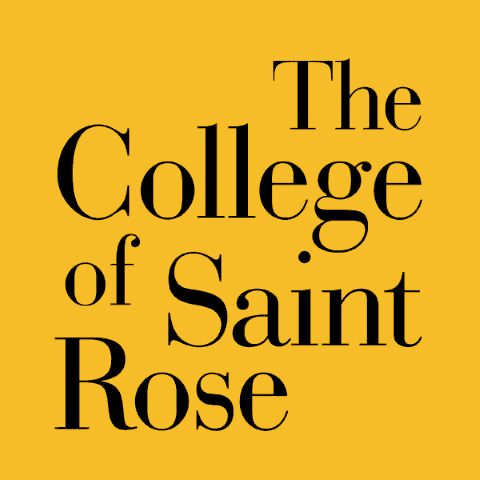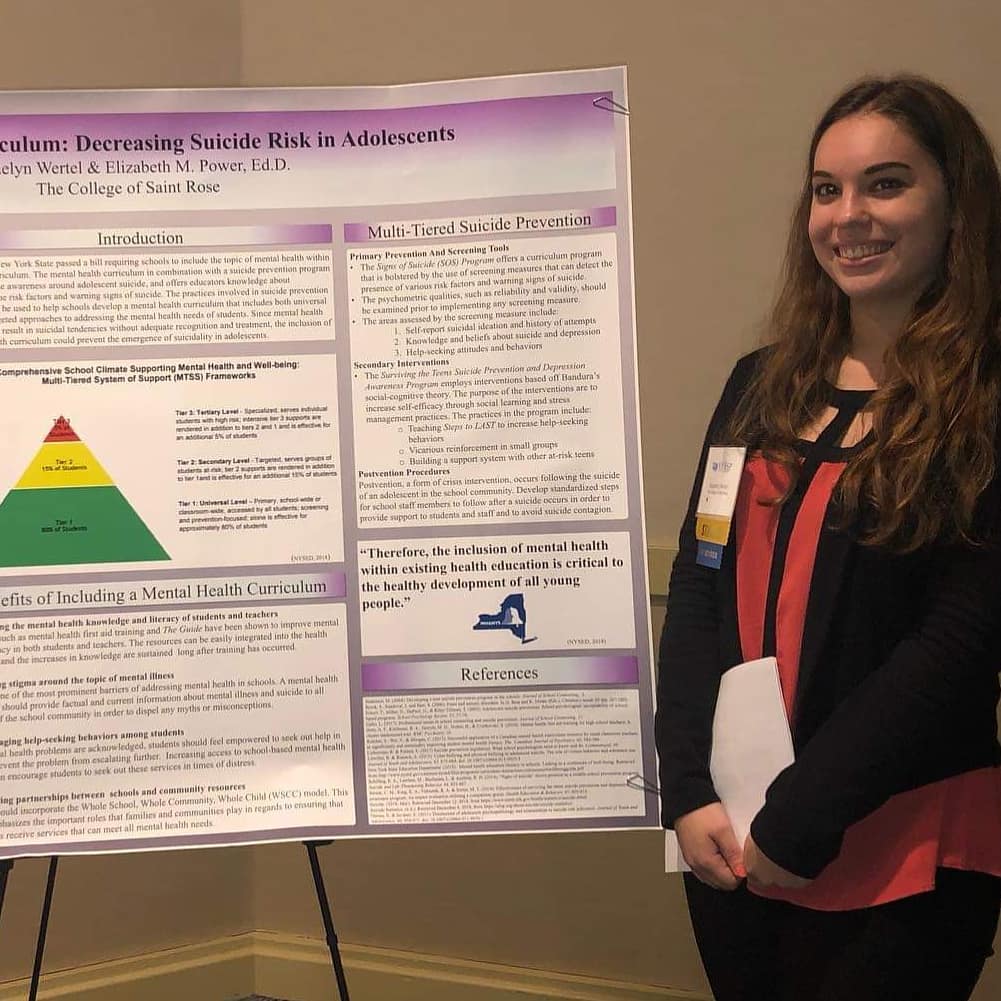Jacquelyn Wertel G’21 is in her second year of Saint Rose’s graduate program in school psychology. As a full-time student in the program, she’s on track to earn an M.S.Ed. and certificate of advanced study (CAS) in three years. The rigorous program can lead to a career working with children who need additional academic, behavioral, and emotional support within a school setting.
Jacquelyn shared her insights into the graduate program and the opportunities she has taken since arriving at Saint Rose.
What attracted you to the School Psychology program at Saint Rose?
I first looked into the Saint Rose school psychology program while attending a graduate school fair at my undergraduate university. I had a strong interest in psychology and always enjoyed working with children, but I was unsure about the type of job I wanted after college. The school psychology program at Saint Rose appeared professional and challenging — most important was that it offered a structured pathway toward a rewarding career as a school psychologist.
Who has been the most influential professor you’ve had so far and why?
Dr. Hoff was been particularly influential. Since I have a passion for learning about mental health issues and interventions, I appreciate Dr. Hoff’s wisdom stressing the importance of developing extensive knowledge around these topics. He believes this is essential when advocating for children and adolescents in the school setting. Dr. Hoff motivates me to get involved in research related to mental health interventions in schools.
What research will you present at the New York Association of School Psychologists (NYASP) Conference?
I am presenting a poster about how instituting a mental health curriculum that incorporates suicide prevention and intervention practices can decrease the rate of adolescent suicide.
Why did you choose this topic?
Once I become a practicing school psychologist, I want to be able to offer extensive information about how school districts can increase awareness about mental health issues that affect children and adolescents. Over time, there has been an increase in adolescent suicide. Since school staff members are likely to witness students exhibiting warning signs of suicide, they should be able to recognize these signs and know what interventions should be administered to the benefit of the students.
Why is pursuing research important to you?
Research provides an opportunity to delve more deeply into topics I am passionate about. My hope is that I will have opportunities in schools to share information about suicide prevention and intervention programs in order to make schools safe, productive, and fun learning environments.
How has this program allowed you to get hands-on experience?
Almost every class offered through the Saint Rose school psychology program offers opportunities for hands-on experience. I have learned how to collect data for a functional behavior assessment while observing a classroom. I am taking a course that trains students on how to administer a variety of cognitive and social-emotional assessments, where we get to work with multiple children and their families.
Have you received any good networking experience from the program in addition to presenting at the conference?
There have been several assignments that required us to make contact with and interview various school psychologists both inside and outside of the Capital Region. I enjoyed speaking to school psychologists about current trends in the schools and their recommendations for future school psychologists.
How is studying school psychology as a graduate student different from studying as an undergraduate?
The workload is far more intense in graduate school, but the work we do is also more rewarding. For example, my studies as an undergrad focused more on theories and less on how those theories can be applied to the real world. The graduate program also wants students to have a solid theoretical foundation, but there are far more opportunities to apply our knowledge through various assignments and activities.
What are some of the challenges you’ve encountered in pursuing your studies or doing fieldwork?
I realized that I wanted to pursue school psychology late in my undergrad career. My understanding of the field was limited and I had limited contacts with professionals who worked in a school environment. While I found that it can be difficult to make new contacts with school professionals early in the program, I also discovered that the professors are willing to share their contacts to help me build a professional network of colleagues.
Tell us about your experiences with time management.
I am a full-time student and I commute to Saint Rose. I have a part-time job in the town where I live. Time management is key! I try to keep my planner organized by writing out when all of my major assignments are due so I can plan ahead. My job is flexible, so I take off time when I can to prioritize my schoolwork. Whenever I find myself ahead of finishing an assignment, I will engage in self-care, such as going to the gym or doing yoga.
What is your typical day like?
Waking up early has helped me get ahead on certain assignments because I am giving myself more time in the day to get things done. If I do not have to work in the morning, I will head over to campus early and go to the library. I am more of a morning person, so I attempt to get as much work done as possible early on, so I can take some time to relax after class.
Seeing my dog after a long day of work and school is another way I like to unwind at night! While days in grad school are never completely typical, I try to keep to an organized schedule whenever I can.
What advice do you have for anyone interested in pursuing school psychology?
I know this may sound cliché, but you get out of this program what you put into it. The professors and coursework will challenge and inspire you to help you become a competent and knowledgeable school psychologist. I am continuously amazed by how much I have learned in just a little over a year since I started the program.
–by Sarah Uzzi G’21




Comments posted on this site are held in moderation until approved by a site administrator. Vulgar, profane, obscene, offensive terms or personal attacks will not be tolerated.